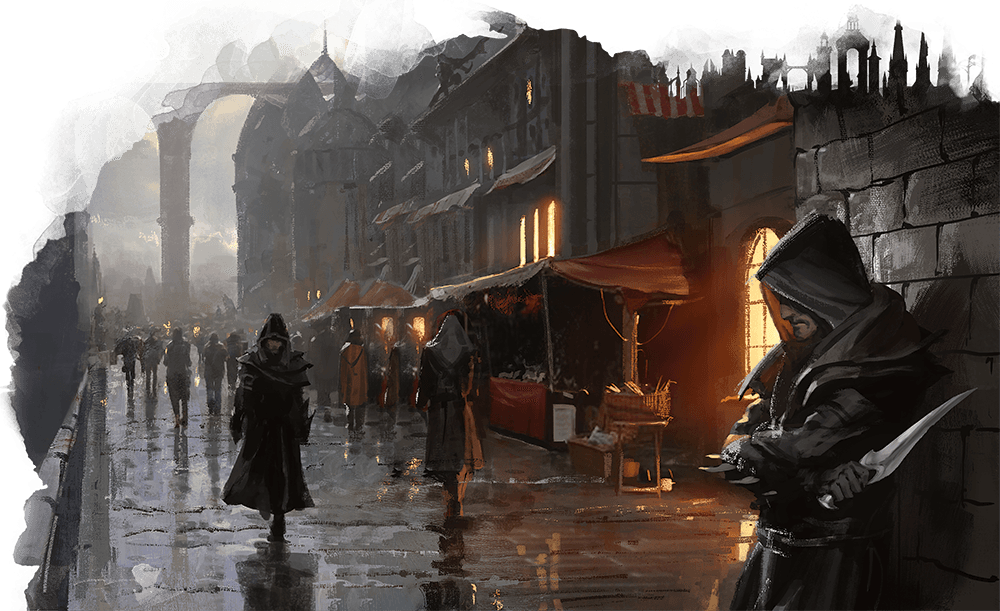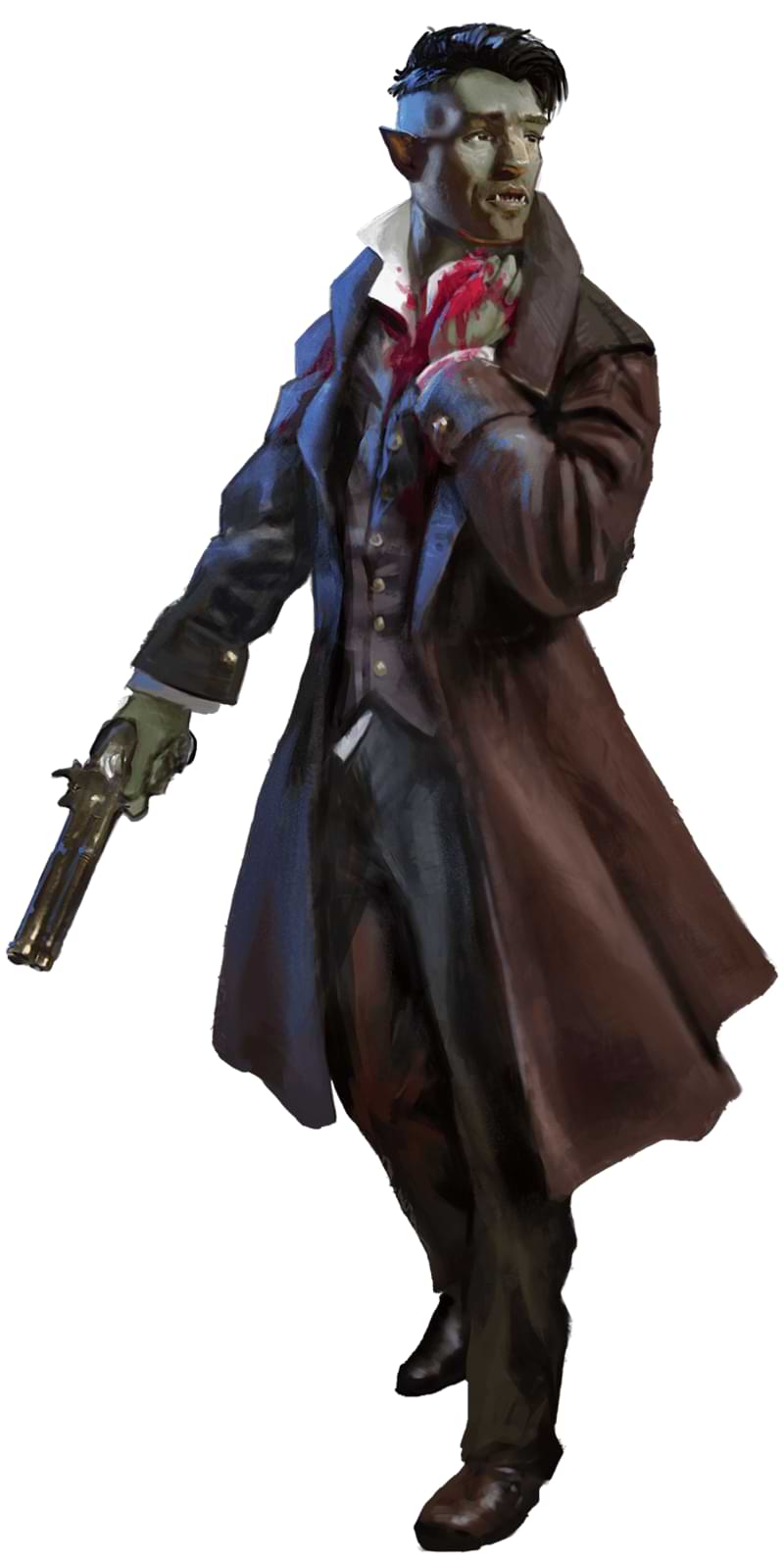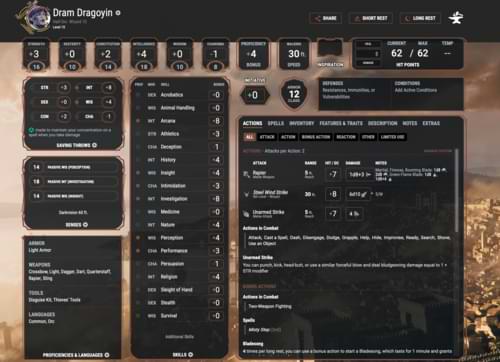Bladesinging is the subclass for wizards who want swordplay to supplement their spells. Alongside the Eldritch Knight — which fulfills the opposite niche for fighters who want spells to supplement their swordplay — the bladesinger is reminiscent of hybrid classes in previous editions of D&D, like fourth edition’s swordmage. It's an excellent choice for anyone hoping to combine the arcane arts with useful melee capabilities.
The bladesinger made its fifth edition debut in the Sword Coast Adventurer’s Guide. There, it was restricted to elf and half-elf characters due to the Forgotten Realms’ traditional portrayal of this ancient elven battle art, which combines sword thrusts with dancelike movements. A revised version was published in Tasha’s Guide to Everything. It removed the racial restriction and includes a few key changes which are outlined below:
Bladesinging features
Training in War and Song
Upon choosing this Arcane Tradition at 2nd level, bladesingers gain proficiency with light armor and one type of one-handed melee weapon of their choice. They also gain proficiency in Performance if they don’t have it already.
While the Bladesinging tradition might have originated amongst elven sword masters, it’s important to note that it no longer requires the use of a blade. As outlined in the Sword Coast Adventurer’s Guide, various Bladesinging styles exist, with each named after an animal and specializing in a different type of weapon. The cat style focuses on swords, the bird style utilizes hafted weapons like axes and picks, and the snake style uses weapons reminiscent of its coiled namesake, like flails or whips. So don’t let yourself be limited by the name of this Arcane Tradition — if you want to make a blacksmith-turnt-bladesinger who fights with a hammer, so be it.
Bladesong
Also at 2nd level, bladesingers receive the key feature of their Arcane Tradition: Bladesong. Even wizards without any interest in getting into melee range will benefit from it. As a bonus action, you can start a Bladesong, which lasts for 1 minute and confers the following benefits:
- An AC bonus equal to your Intelligence modifier, with a minimum of +1.
- Increased walking speed by 10 feet.
- Advantage on Dexterity (Acrobatics) checks.
- A bonus on Constitution saving throws to maintain concentration on a spell. This bonus is equal to your Intelligence modifier, with a minimum of +1.
You can end the Bladesong at any time, and can only activate it if you aren’t wearing medium or heavy armor or using a shield, which are two conditions that can end the song early. The song also ends if you are incapacitated or use two hands to make an attack.
The Sword Coast Adventurer’s Guide version of the bladesinger limited the Bladesong’s usage to twice per short or long rest. Notably, Tasha’s Cauldron to Everything has tweaked this, allowing bladesingers to invoke their song a number of times equal to their proficiency bonus, with all uses regained on a long rest. This allows bladesingers to use their claim to fame more often as they level up, though they still need to be judicious in choosing which battles warrant their song.
Extra Attack
At 6th level, bladesingers can attack twice whenever they take the Attack action. They can cast a cantrip in place of one of the attacks, which is another handy addition that the Tasha’s Cauldron of Everything version of this subclass instituted. Not only does this change tie in with the image of a magus using one hand to sling spells as the other slashes away, it also ups the bladesinger’s flexibility. No longer do bladesingers need to choose between making two attacks or casting booming blade — now they can do both.
Song of Defense
At 10th level, bladesingers can absorb damage when their Bladesong is active by using a reaction to expend one spell slot. The damage is reduced by an amount equal to five times the spell slot’s level. Losing a spell slot in such a manner obviously isn’t ideal, but it might mean the difference between a bladesinger staying on the battlefield or getting KO’ed by a critical hit from a boss monster’s legendary action.
Song of Victory
At 14th level, bladesingers can add their Intelligence modifier (at a minimum of +1) to the damage of their melee attacks while their Bladesong is active. Considering that most wizards prioritize Intelligence as their highest ability score, this feature is the perfect chance to turn intellect into high damage output.

Pros
Bladesingers are a fine choice for players hoping to build a variation of the classic roleplaying “gish,” which is a character that is skilled in both physical combat and magic. With access to the most flexible spell list in Dungeons & Dragons, bladesingers can choose between slinking into melee range with shadow blade and tossing fireball from the backline. Unlike similar gish subclasses like the Eldritch Knight, Bladesinging gives you full spell slot progression, allowing you to lean more on defensive spells like shield and absorb elements to stay on your feet.
Cons
Bladesingers can hold their own in combat, but when compared to the Eldritch Knight and the Hexblade, they’re squishy combatants. They have to make do with d6 Hit Dice and light armor proficiency. They’re also heavily dependent on their Bladesong, so if you’re facing multiple combat encounters in a row, expect to end up in the backline at some point.
Lastly, when it comes to spell selection, you might find yourself having to choose between spells that make you better at being in melee range and spells that help you contribute to combat when you're out of Bladesong uses.
Meet Dram Dragoyin, the half-orc bladesinger
The old man tried to scream, but a punch to his gut from the thug’s knuckle dusters knocked the wind out from him. Falling to the ground with tears in his eyes, the old man helplessly watched as the crooks snatched his purse, eagerly removing its coins like ravenous hyenas.
Suddenly, the swish of a rapier cut through the darkness, and one of the thugs yelped, dropping the purse. The other swung his fists at a broad-shouldered figure who stepped from the shadows, but to no avail. With another strike from the blade and a blast of thunderous magic that reverberated throughout the alleyway, both thugs were down on the ground.
“They won’t trouble you any longer,” the half-orc murmured as he helped the old man up, tucking his rapier away with a lithe, cat-like adroitness.
 Dram Dragoyin is a half-orc who learned the art of bladesinging from his husband, a half-elf named Zannan Nith’gem. A Baldur’s Gate resident who previously worked as a transporter of rare books, Dram met Zannan 10 years ago when thieves tried to assault him on his way to the great library of Candlekeep. While Dram could hold his own against the ruffians, his skill was nothing compared to that of the daring half-elf, a practitioner of the Bladesinging cat style who had travelled the Sword Coast for years as an adventurer.
Dram Dragoyin is a half-orc who learned the art of bladesinging from his husband, a half-elf named Zannan Nith’gem. A Baldur’s Gate resident who previously worked as a transporter of rare books, Dram met Zannan 10 years ago when thieves tried to assault him on his way to the great library of Candlekeep. While Dram could hold his own against the ruffians, his skill was nothing compared to that of the daring half-elf, a practitioner of the Bladesinging cat style who had travelled the Sword Coast for years as an adventurer.
Dram was fascinated by Zannan, and begged him to share the secrets of his sword artistry. A friendship emerged, and this friendship soon turned into love as the two bonded over their mixed heritage and shared a propensity for helping those in need.
The pair took up residence in the Outer City of Baldur’s Gate as private investigators, helping locals who were ignored by the Watch and Flaming Fist. Stories of the courageous duo, both wielding rapiers with supernatural speed and power, began to flow through the city, and Dram and Zannan became targets of the Guild, the notorious crime syndicate of Baldur’s Gate.
Most recently, Dram and Zannan have been investigating a series of smokepowder thefts that might be connected with the Guild. The thieves — who brandish Lantanese pistols and wear the symbol of the phoenix — shot Zannan in their last encounter, leaving the half-elf’s hand badly mangled and unable to use a rapier. Dram has spent the past several weeks caring for his beloved, but is eager to bring these gunslingers to justice with the merciless crescendo of his Bladesong.
Playing Dram
Dram is a chaotic good wizard with the Investigator background from Van Richten’s Guide to Everything. His highest ability score is Intelligence, and his second highest is Strength. Dram’s Charisma and Dexterity scores are low, though Bladesong grants him advantage on Dexterity (Acrobatics) checks. One can imagine that his bladesinging movements lack the natural grace of Zannan’s, but make up for this deficit with stronger, more aggressive attacks.
Dram has proficiency in the following skills and tools:
Dram began his magic journey by secretly studying spellbooks while transporting them to Candlekeep years ago. Zannan has since helped him learn more spells, and the half-orc has the War Caster feat to supplement his spellcasting in combat. Dram’s preferred cantrips, which he’ll often use in place of his Extra Attack, are blade ward, booming blade, green-flame blade, sword burst, and true strike.
Dram will readily use misty step and mirror image to dart around his enemies, plus shield and absorb elements to avoid damage. The strongest spell in his arsenal is steel wind strike.
Most of Dram’s other spells were chosen due to their usefulness on investigations. These include alarm, charm person, see invisibility, and locate creature. Dram also has greater invisibility at his disposal in case he needs to spy on a group of criminals and then spring into action to catch them by surprise.
While normally calm and collected, Dram can turn angry if anyone dares to make a snide comment about someone with orcish blood using the traditionally elven Bladesong. He’s also fiercely defensive of Zannan, and has come to blows in the past against prejudiced remarks that mock the union of a half-orc and a half-elf.
Playing Dram as an NPC
Dram can be a great ally in any campaign taking place in Baldur's Gate. He will be infinitely grateful to any adventurer who can heal Zannan’s grievous injuries with regenerate. His investigation into smokepowder thieves bearing the symbol of the phoenix was inspired by a line in the Baldur’s Gate: Descent into Avernus Gazetteer, and could very well be the setup for an epic showdown of guns versus swords in the grimy streets of the Gate!
Sling a song of spells and blades
Previously limited due its racial restriction, the Bladesinging Arcane Tradition is now open to all heroes who have dreamed of spinning across the battlefield with finesse and panache. For those who like to mix magic with their melee or reminisce about D&D’s older classes like the spellsword, the Bladesong might provide just the right tune.
Jeremy Blum (@PixelGrotto) is a journalist, gaming blogger, comic book aficionado, and fan of all forms of storytelling who rolled his first polyhedral dice while living in Hong Kong in 2017. Since then, he's never looked back and loves roleplaying games for the chance to tell the tales that have been swirling in his head since childhood.


-
View User Profile
-
Send Message
Posted Aug 2, 2021Wow! Thanks!
-
View User Profile
-
Send Message
Posted Aug 2, 2021Attacking with a weapon is cool but as a DM I see the real strength being the AC improvement. I wish they would have revised it to adding their prof. bonus to the AC and not INT, and Bladesong used their INT modifier.
-
View User Profile
-
Send Message
Posted Aug 2, 2021Honestly it makes more sense role play wise this way. You use your intelligence to predict and dodge away from attacks, rather than simply being protected from a magical force or something that relies on your power, and you use your power to activate your bladesong, rather than your intelligence allowing you to sing more. Also it makes more sense balance wise too, because if it was intelligence you could use your bladesong more at the start, but it’s progression would be erratic and not particularly good.
-
View User Profile
-
Send Message
Posted Aug 2, 2021This subclass is one of my favorites! It’s so cool!
-
View User Profile
-
Send Message
Posted Aug 2, 2021I would replace strength with dexterity if you were using a rapier but be free to customize your character however you want.
-
View User Profile
-
Send Message
Posted Aug 2, 2021Finesse allows you to use dexterity, it doesn’t force you to. You can still use strength.
-
View User Profile
-
Send Message
Posted Aug 3, 2021Seconded. And someone seeing a rapier might assume you have a higher dexterity than you do and avoid spells with DEX saving throws.
-
View User Profile
-
Send Message
Posted Aug 3, 2021This is hilarious. One of my NPCs is a half-orc bladesinger whose husband is an elven wizard. And this article's character example is a half-orc bladesinger whose husband is a half-elven wizard. The resemblance is...uncanny. Almost certainly a coincidence, but still. Amusing. Varog and Dirrian would like to have a word, though.
Good article.
-
View User Profile
-
Send Message
Posted Aug 3, 2021Why would anyone take True Strike as a cantrip? Barring some niche rogue multiclass build, it's always better to attack twice than to attack once with advantage.
-
View User Profile
-
Send Message
Posted Aug 3, 2021I can't be the only one seeing a multiclass with a swashbuckler rogue
-
View User Profile
-
Send Message
Posted Aug 3, 2021The Bladesinger's Extra Attack feature seems like it has a lot of potential uses.
One possibility is a Warlock multiclass build - you can eldritch blast every turn and also attack, or attack with your familiar if you go Pact of the Chain. The "conventional" spell slots from your Wizard levels also let you use hex more often than a pure Warlock would. If you're one of the new UA Dragonborn, you can even use your breath weapon and EB in the same action.
Also, using a cantrip as part of your Extra Attack has to override its normal casting time (the feature wouldn't work otherwise), so it should allow mending to be used every turn instead of taking a minute to cast. This probably isn't intended and I would definitely run it by the DM first, but if it's allowed then it could be useful in a party with a Battle Smith artificer.
Finally, I love the idea of a Bladesinger with the thorn whip cantrip (either from Artificer Initiate or straight-up multiclassing) who grabs an enemy with one hand and then attacks with the other.
-
View User Profile
-
Send Message
Posted Aug 3, 2021My favorite subclass in DnD. This is the reason Wizards get Steel Wind Strike. Too bad, Warlocks. ;p
-
View User Profile
-
Send Message
Posted Aug 3, 2021Great character, but honestly, who uses True Strike? It's a completely useless cantrip, just attack twice for the same chance of hitting with a chance of hitting twice. I'd replace it with a range option, or if you want to keep the close-range aesthetic going use something like Shocking Grasp or Poison Spray.
-
View User Profile
-
Send Message
Posted Aug 3, 2021Hah, I guess I'm not the only one to come up with a married orc/elf combo! It's a coincidence, but maybe you should have Dram and Zannan meet Varog and Dirrian one day and be like...do we know you two?
-
View User Profile
-
Send Message
Posted Aug 3, 2021Great Article!
When you said: Zannan has proficiency in the following skills and tools, did you mean Dram, since it was his description?
-
View User Profile
-
Send Message
Posted Aug 3, 2021I love my bladesinger so much. It's so much fun to play. I really think it's an underrated Wizard subclass.
-
View User Profile
-
Send Message
Posted Aug 3, 2021It does have one, admittedly situational, use. It has only a somatic component, which is described in the spell's description as pointing your finger at the target, something that would not be immediately recognizable as casting a spell. So if you're in a situation where you're talking but you know someone is going to attack, and you can RP something where you point your finger at someone, you can potentially get advantage on one attack essentially for free (whereas attacking a turn earlier, or performing any obviously hostile action, would simply mean that initiative gets rolled earlier).
-
View User Profile
-
Send Message
Posted Aug 3, 2021True strike and sword burst? Those are both terrible cantrips.. please do not pick those. Take Minor Illusion and Fire bolt instead to give you some more options.
-
View User Profile
-
Send Message
Posted Aug 3, 2021Arcane Trickster ;)
-
View User Profile
-
Send Message
Posted Aug 4, 2021Would it be Van RIchten's Guide to Ravenloft?